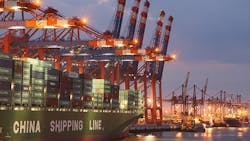China Exports Surge Tainted by Fears of Trade Turmoil
Chinese exports surged more than forecast in January, data showed on February 10 in a fresh sign of improvement in the world's number two economy as leaders prepare for possible trade stand-offs with President Donald Trump.
The strong figures come as Beijing looks to position itself as leader of the global trade regime in anticipation of a U.S. retreat under a protectionist Trump administration.
Officials at the Customs bureau said overseas shipments jumped 7.9% on-year to $182.8 billion, easily outstripping the 3.2% tipped in a survey of economists by Bloomberg News. It also reversed December's 6.1% plunge.
Last month data showed the economy, a key driver of growth around the world, expanded in 2016 at its slowest pace for more than a quarter of a century, but saw a surprise improvement during the final three months.
And last week a reading on factory activity for January indicated the manufacturing sector was stabilizing.
Imports also exceeded expectations, rising 16.7% to $131.4 billion, compared with an expected 10% increase. The trade surplus climbed to $51.3 billion, beating estimates by more than $2 billion.
"Chinese trade values have been picking up in recent months thanks to a revival in global manufacturing, the continued strength of China’s domestic economy and the rebound in global commodity prices," said Julian Evans-Pritchard of Capital Economics.
However, he pointed out: "It’s likely that much of the pick-up last month was seasonal", noting that "all of the pre-holiday rush to import goods and meet exports orders fell in January", with the country stocking up before Chinese New Year, when most businesses close.
Global Pick-up
"The strong data was related to the global pick-up in growth in the US, Europe and also emerging economies," Mizuho Securities chief Asia economist Shen Jianguang told Bloomberg News.
But it can also be explained by a weakened yuan, which has made Chinese exports more affordable, Nomura analysts said.
The yuan is wallowing near eight-year lows against the greenback as investors, frightened by a weaker Chinese economy and the prospect of better returns in the U.S., withdraw their cash from the country.
Exports, Nomura said in an analyst's note, "are benefiting from the depreciation of RMB’s real effective exchange rate over previous quarters".
Chinese stocks closed solidly higher on February 10 as investor confidence was boosted by the trade data, dealers said, with the benchmark Shanghai Composite Index up 0.42%.
Yet while overall exports grew, China's steel exports fell 23.8 percent in January year-on-year, customs said -- the result of Beijing’s efforts to reduce steelmaking overcapacity after continuous pressure from the EU and the U.S., which have accused the Asian giant of dumping.
By far the world’s largest producer of steel, China last month exported 7.42 million tons of the product – less than the 9.74 million tons exported in January 2016 and the 7.8 million tons in December.
'Risk of Sino-US Trade War'
Despite optimistic assessments of the strong trade figures, most analysts agreed that President Donald Trump’s hawkish trade policy stance towards China posed a major risk to continued Chinese export growth this year.
The billionaire politician seemingly remains intent on following through with a series of election promises that included a review of global trade deals he says are unfair to the U.S.
Last week he once again accused Beijing -- as well as Japan -- of currency manipulation to give its exporters a trade advantage of US firms, while he has also warned of huge tariffs on Chinese goods.
"The exports outlook for China is good, except for the potential risk of a Sino-U.S. trade war," Shen said.
A high-ranking diplomat from an EU country said he believed a U.S.-China trade war "would damage the Chinese economy but still be manageable" -- though one accompanied by trade frictions with the EU "would be potentially disastrous for China."
Hopes for a less confrontational relationship between the two economic giants were boosted on February 10 by news Trump had reaffirmed to President Xi Jinping Washington's "One China" policy.
The move, acknowledging Taiwan is not a separate country, was seen as an apparent effort to ease tensions after Trump angered Beijing by questioning the policy that underpins Sino-U.S. relations.
Copyright Agence France-Presse, 2017
About the Author
Agence France-Presse
Copyright Agence France-Presse, 2002-2025. AFP text, photos, graphics and logos shall not be reproduced, published, broadcast, rewritten for broadcast or publication or redistributed directly or indirectly in any medium. AFP shall not be held liable for any delays, inaccuracies, errors or omissions in any AFP content, or for any actions taken in consequence.
